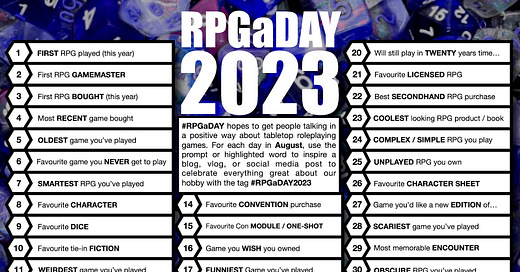This is my sixth post for RPGaDay 2023, if you’re not sure what that is you can find Autocratik’s blog post about it by clicking here.
Basically a list of prompts is provided to generate discussion around RPG topics, with creators making a blog post, video or podcast each day during the month of August, the list of prompts is included below:
My Favourite game I never get to play
Okay so I’m going to cheat a little bit here, since I have actually played the game I’m going to discuss in a few short campaigns online run by my friend Johannes. The game I am talking about is Burning Wheel.
Myself and Johannes have talked at length about this game on previous podcasts and videos, so I won’t go into the game in massive detail but essentially its a game designed by Luke Crane with a heavy Tolkine inspiration; the author is unapologetic about the design of the game, saying that it is very much a game designed for his own group that was published because people kept asking for it.
The current game comes in two books, the Red/Gold edition and the blue Codex book.
There are a few aspects of the game that really stand out to me:
The life-path(ish) character creation where you get to select a number of life-paths (peasant, town guard, noble, etc), the number depending on how powerful the GM wants you to start as. Each path gives you certain skills and abilities, funneling you into the paths that you can choose following it.
Characters advance in skills during the game by making skill rolls, each time you make a roll you put a tick next to that skill and—when you get a certain number—it advances.
There is a detailing system for learning skills, etc during periods of downtime when your character is not actively adventuring, although you tend to accumulate skills and the like slower using this method, I love the fact that your characters are not just static when they aren’t adventuring.
There are a number of sub-systems (referred to as spokes of the wheel) in the game that can be used to zoom in on particular elements that may be important for a particular encounter, the two that come to mind are the systems for dealing with duels and for social situations; these are not used all the time (and the author is at pains to point this out) but only when a climatic combat or debate with more detail is advisable.
So, if the game is this good why isn’t it played more often?
It’s a good question and I think there are a number of answers for it, one is the afore-mentioned fact that the game was designed to appeal to the author and his table, so if you don’t gel with that particular style of game then you may find Burning Wheel not to your taste. It is also a quite intimidating book with a lot of rules and “crunch” in it, I have to confess that—until we played a couple of games—there were a few things I had a little difficulty wrapping my head around, although once I saw them in-play they made perfect sense.
I also believe that Burning Wheel was designed—and benefits massively from—prolonged campaign play, although it can be played as one-shots and shorter runs the game is really designed around the idea of taking a character and developing them throughout long running gameplay and rewarded players who invest the time in mastering the system. Picking up the game isn’t that difficult once you are playing it, but some of the nuances and detail of the system only really start to bed in once you’ve been playing it for a while, and you learn how to use the system as it was intended to be used.
That said, I have thoroughly loved the one-shot and two campaigns that I have played in and hope Johannes gets round to running it again at some point, would I run it myself? I’m not sure to be honest, I like to think I’d give it a go, but I’d have to do a serious amount of reading up before I felt confient in doing so.
If you want to get involved in the conversation or give us some feedback you can comment or leave us a voicemail at: https://www.speakpipe.com/RDDRPGPodcast
Or email us at RDDRPGpodcast@gmail.com





